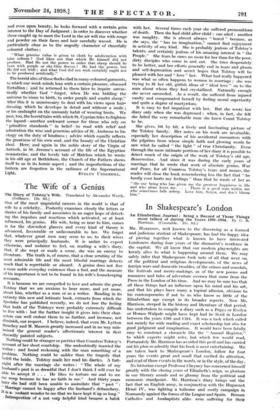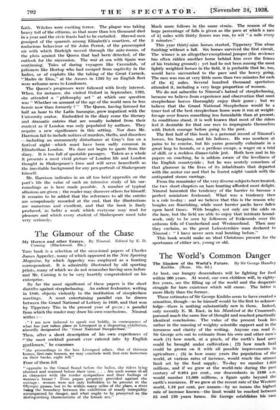In Shakespeare's London
An Elizabethan Journal : being a Record of Those Things most talked of during the Years 1591-1594. By G. B.
Harrison. (Constable. 31s. 6d.)
MR. HARRISON, well known to the discerning as a learned and judicious student of Shakespeare, has had the happy idea of piecing together what is known to have interested Londoners during four years of the dramatist's residence in the capital. We all know that our modern playwrights are keenly alive to what is happening around them. We may safely infer that Shakespeare took note of all that went on, of the political and religious developments, of the news of foreign wars and domestic troubles, of the crimes and scandals, the festivals and merry-makings, as of the new poems and romances and tales of adventure oversea that came from the Press in the London of his time. And we may be sure too that all these things had an influence upon his mind and his art, and that his plays have many a topical allusion, obvious to his contemporaries if not to us who know so little of the Elizabethan age except in its broader aspects. Now Mr. Harrison, steeped in the history and literature of that period, has undertaken to compile a diary such as a Pepys or Evelyn or Horace Walpole might have kept had he lived in London between the years 1591 and 1594. It was a task which called not merely for wide reading and exact scholarship but also for good judgment and imagination. It would have been fatally easy to construct a chronicle like the " Annual Register," to which experts might refer, but which few would read, Fortunately Mr. Harrison has avoided this peril and has carried out his plan so adroitly that his book is most entertaining. We are taken back to Shakespeare's London, follow for four years the events great and small that excited its attention, and read of those events in the words, or in the style, of the day.
No historian except Professor Cheyney has concerned himself greatly with the closing years of Elizabeth's reign, so glorious in our literary annals and so gloomy from the political and economic standpoint. Mr. Harrison's diary brings out the fact that an English army, in conjunction with the Huguenot Henri IV., was fighting a toilsome and costly campaign in Normandy against the forces of the League and Spain. Roman Catholics and Anabaptists alike were suffering- for their
faith. Witches were exciting terror. The plague was taking heavy toll of the citizens, so that more than ten thousand died in a year and the civic feasts had to be curtailed. Shrewd men gossiped of the quarrels among Elizabeth's courtier's, of the audacious behaviour of Sir John Perrot, of the preoccupied air with which Burleigh moved through the ante-rooms, of the plots against the Queen that had -been' detected, of the outlook for the succession. The war at sea with Spain was continuing: Tales of daring voyagers like Cavendish, 'of prfsoners like Hortop who had escaped from captivity in the Indies, or of exploits like the taking of the Great Carrack, tMadre de Dios," at the Azores in 1592 by an English fleet were welcome news to Londoners.
The Queen's progresses were followed with lively interest. When, for instance, she visited Oxford in September, 1592, she attended a philosophy act at which one question was " Whether on account of the age of the world men be less heroic now than formerly Y " The Queen, having listened for half an hour to the Latin harangue, grew impatient with the University orator. Embedded in the diary come the literary and dramatic entries that are usually isolated from their context as if London was only populated by authors. They acquire. a new significance in this setting. Nor does Mr. Harrison fail to include notices of murders, thefts, and disorders —including an unmannerly disturbance at Gray's Inn on a festival night—which must have been sadly common in Elizabethan London. We dare not begin to quote from the diary. It is too full of quotable passages. Taken as a whole it presents a most vivid picture of London life and London thought in Shakespeare's time and will serve henceforth as the inevitable background for any pen-portrait of Shakespeare himself.
Mr. Harrison indicates in an all too brief appendix on the poet's life the value of such an intensive study of his sur- roundings as is here made possible. A number of typical allusions are given ; the reader may discover others for himself. It remains to be added that the references to all the entries are scrupulously recorded at the end, that the illustrations are numerous and excellent, and that the book is finely produced, -as" belltd a work- which everyone may read for pleasure and which every student of Shakespeare must take very seriously.



















































 Previous page
Previous page